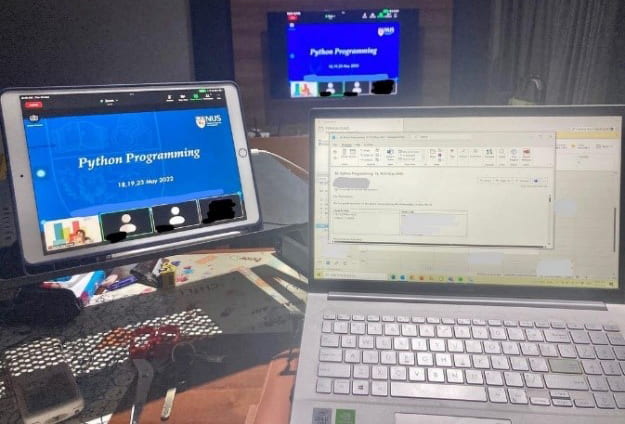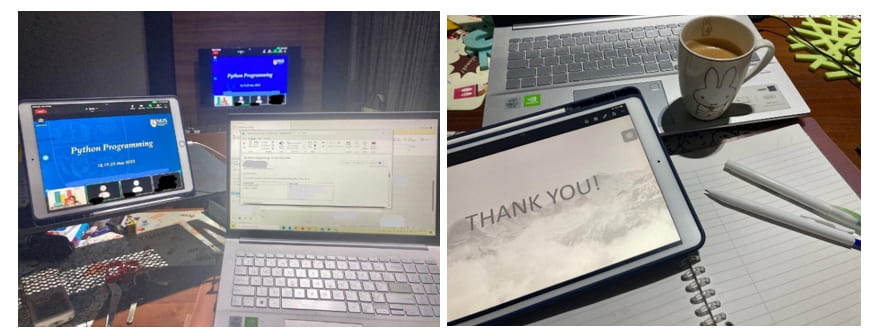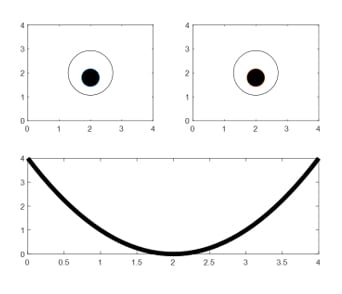LEE Lai Yeng, Cindy
Department of Chemical & Biomolecular Engineering,
College of Design & Engineering (CDE)
Cindy reflects on her experience after taking a Python programming course to enhance her capacity in this area, including how it has informed her practice and engagement with students.
Lee, C. L. Y. (2023, March 30). The learner becomes the master (and vice versa): An educator’s personal adult learning journey. Teaching Connections. https://blog.nus.edu.sg/teachingconnections/2023/03/30/the-learner-becomes-the-master-and-vice-versa-an-educators-personal-adult-learning-journey/
One of the most famous quotes in the movie Star Wars was when Darth Vader said, “I was but a learner, now I am the master” (Lucas, 1977). As an academic we always look forward for our students to gain confidence and mastery in the skills and knowledge that we are imparting to them; that is, for the learners to become the Master one day.
In the fast changing industrial landscape and rapid technological advancements around the world, it has become evident that the “Masters” can no longer remain as “Masters” if they do not upgrade themselves to keep up with emerging industry-based skills and knowledge. As an educator, I often find myself in situations where I need to keep abreast of the latest technological developments and skills that will be relevant to students taking courses in our Department, such as material energy balances, process dynamics and control, and chemical process optimisation, where modern software and computing tools need to be incorporated into the curriculum to stay relevant in the subject matter.
My recent experience of taking formal lessons (with assignments and assessments) to acquire new skills opened my eyes to the myriad challenges our students face. This post highlights some reflections that me and my colleague (Dr. YAP Swee Kun) had when we embarked on the Python Programming Course1, and other courses (MATLAB data visualisation, Digital Twin, etc) that appealed to our individual development. Some of my personal reflections as I embarked on this adult learning journey are highlighted below:

Figure 1. Pulling out all resources (and coffee) during our lessons.
1. There is never a perfect time
Learning takes time. Though our experiences as working adults may have trained us to be accustomed to multi-tasking, I personally found learning to be more fruitful when there were less distractions. Time is a scarce and highly valued commodity, especially for adult learners. As such, we need to intentionally allocate the time needed to attend lessons, go through the course materials (before and after), and work through assignments (if any). However, given our hectic work and family commitments, there may almost never be a perfect time to start on that course. Sometimes, we do need to take a leap of faith when embarking on such a learning journey, to commit ourselves and squeeze it into our schedules, albeit with a significant increase in caffeine consumption to keep going!
2. We are better together
Having the support of your family and friends is important. For instance, having my children cheer me on as I attended the online classes at midnight was a motivational booster. Also, having a friend and colleague like Swee Kun as a course mate was a great experience. My learning experience was enriched greatly by having someone to exchange ideas with, discuss and clarify concepts, or just having someone to commiserate with and give each other encouragement when the going gets tough!
3. Build your “Spiderman” web (Networking)
One of the benefits of learning in an adult learning environment is the network that you can build with like-minded professionals. This has always been one of my favourite parts of learning as it gives me the opportunity to extend my network and work with course mates from different countries, backgrounds, and to exchange valuable perspectives on the subject.
4. Make your learning come to life!
Right after completing a course on data visualisation with MATLAB, I decided to apply and share this as much as possible in my work and teaching. In the course SH54062 “Research Methodology”, I had the opportunity to apply what I learnt during the course. I designed two sessions of learning activities for students on data processing and visualisation using MATLAB live scripts, demonstrating how students can search for relevant data from online databases, import the data into MATLAB and use the data visualisation tools to plot and present data effectively. Applying what I learnt in my teaching helps me to iron out many of the uncertainties I had while taking the course.

Figure 2. Demonstrating the creation of subplots in MATLAB.
With the recent emphasis on lifelong learning and skills development, it is even more important for educators like us to be given time and the opportunity to embark on a similar journey of improvement and learning. The Python Programming and MATLAB courses have enabled me to formulate new ideas and examples (data processing, data visualisation, etc) that I can use in the courses I teach. For instance, I have learnt how to design scaffolded learning materials in MATLAB using live scripts in SH5406. Additionally, this will also be useful in other undergraduate courses that I teach which embed MATLAB programming for problem-solving. The experience of being a student again helped me to be more empathetic and mindful towards the challenges adult learners might encounter, and this is particularly useful in my delivery of MSc courses For example, I am aware that some mature students grapple with issues related to attention span and maintaining focus, especially during evening classes, and I have been designing activities to engage them in class. I was able to apply much of what I learnt from the courses to design hands-on learning experiences to capture their attention, and to help them be more focused and interested in the subject (e.g. using applications like Padlet for class exercises and to facilitate discussions). I am currently taking other professional education certificate courses relevant to my teaching practice, which will help me deliver meaningful learning activities for our students.
endnotes
- Swee Kun and I attended this course under the SkillsFuture initiative, utilising our SkillsFuture credits.
- SH5406 was a new course which I started teaching in Semester 1, AY2022/23.
Reference
Lucas, G. (Director). (1977). Star Wars: Episode IV A New Hope [Film]. Lucasfilm.
 |
Cindy LEE is a Senior Lecturer at the Dept of Chemical & Biomolecular Engineering, College of Design & Engineering (CDE). Her research and teaching interests include sustainable development and digitalisation. She is a committee member of the IChemE Education Special Interest Group and is interested in embedding sustainability and digital skills into her teaching to enhance student skills and learning experience. Cindy can be reached at chellyc@nus.edu.sg. |

